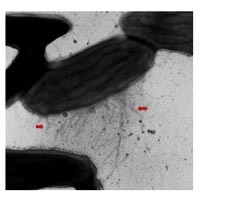Micro-organisms produce natural wires to conduct electricity
Amherst (MA) - Scientists studying how a class of micro-organism called Geobacter sulfurreducens generates electricity to help remove radioactive material such as uranium from ground water, have discovered they actually build conductive 3 - 5 nm "nanowires" whose length can be measured in microns. The discovery is being published in the June 23 edition of the journal Nature.
"This completely changes our concept of how microorganisms can handle electrons," stated Derek R. Lovley, microbiologist and principal researcher with the Geobacter research team at the University of Massachusetts, Amherst, in a press release issued this morning. "It also seems likely that microbial nanowires could be useful materials for the development of extremely small electronic devices," he added.
According to the Nature report, the team had previously focused on the role that outer membrane cytochromes play in the transfer of electrons. Cytochromes are protein molecules that normally carry electrons by virtue of exchanging iron, or iron and sulfur, atoms with one another. This transfer of electrons is necessary to the exchange of nutrients in soil and sediments, and the breakdown of residual organic matter - including some that may be radioactive. The researchers had been focusing specifically on the role that a particular iron oxide nanoparticle, called an Fe(iii) reducer, plays in collecting and distributing electrons between cytochromes - like an electron propagation system.
The practical implications of this discovery extend to the realm of environmental cleanup and restoration - for instance, in eliminating contaminants caused by oil spills or pollution settlement - as well as the possible future development of microbial fuel cells that produce electricity from organic waste.
The first strain of Geobacter was discovered, reports the research team, in 1987, from a sample taken from the Potomac River just downstream from Washington, D.C. The entire story of the Geobacter project can be found at www.geobacter.org.
Get Tom's Hardware's best news and in-depth reviews, straight to your inbox.
